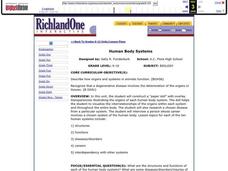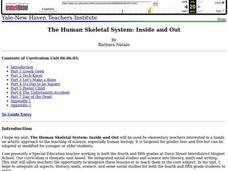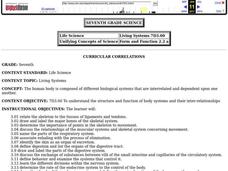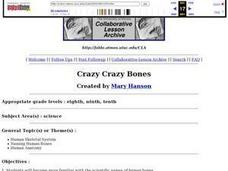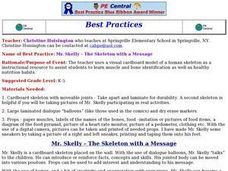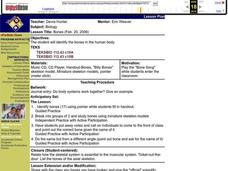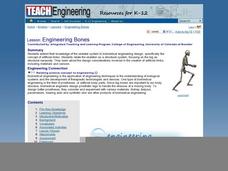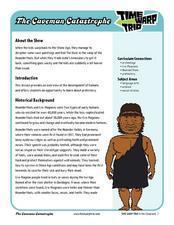Curated OER
Human Body Systems
Students explore the systems that comprise the human body. In this human physiology lesson, students create a model of the human body and research a disease from a particular system. Students will then choose to either interview a person...
Curated OER
Preschool Lesson Ideas: Human Body Lesson Plan and Five Senses Activities
Students explore their five senses. In this human biology lesson, students participate in various learning centers that include activities such as creating a Q-tip skeleton, feeling play dough, creating "goop" and listening to drum beats.
Curated OER
Owl Pellets
Pupils dissect owl pellets, and compare, identify and record rodent skeletal parts. They compare rodent skeletal diagrams to human skeletal diagrams.
Curated OER
Life Science: Human Body Skit
Students create skits based on the human body systems. Working in groups, they role-play as organs in the various systems. They make costumes or wear signs identifying themselves as the organs in their skits.
Curated OER
The Human Skeletal System: Inside and Out
Students investigate the body. In this biology lesson plan, students will learn the basics of the bones in their body and about how they can be injured. Students will participate in a total of seven activities designed to improve their...
Curated OER
Human Anatomy
Students use the web to explain how the bones serve as protection for organs in the body and recognize some of the bone structure that protect certain organs. They comprehend the different structure and functions of support tissue...
Curated OER
The Skeleton Within
Fourth graders explore the bones, joints, and other attributes of the skeletal system.
Curated OER
Human Body Systems
Seventh graders investigate the structure and function of body systems and their inter-relationships. They draw and label the major body systems, observe demonstrations of various body systems, define key vocabulary terms, and compare...
Curated OER
Human Body Quest
In this biology worksheet, students describe and name their organ system selected and its major functions. Then they create a diagram of their body system with the major parts and organs labeled. Students also write facts about their...
Curated OER
The Human Body- Skeletal System
Sixth graders record a video. In this skeletal system lesson, 6th graders review what they already know about the skeletal system and then watch a presentation. Students work in groups to discuss what they learned and write a script for...
Curated OER
Invertebrate Diversity
Comparative anatomy prevails in the lesson exploring diversity among invertebrates. Biologists examine physical characteristics of an earthworm from phylum annelida and a meal worm from phylum insecta. They also inspect a cricket and a...
Curated OER
Chalkboard Challenge: The Beginning of Human Society
After studying Ancient Civilizations, learners could use this jeopardy-like game as a review. Having questions relating to the Neolithic, Paleolithic Era, and more, this presentation would be a great whole class or center activity.
Curated OER
Crazy Crazy Bones
Students practice labeling the bones of a human skeleton. Students reword the song "Dry Bones" with the accurate names of the bones listed.
Curated OER
Health: The Skeleton with a Message
Students identify human muscles and bones from a cardboard skeleton, named "Mr. Skelly." Using dialog balloons as props, the teacher holds up advice from Mr. Skelly, such as noting he drinks milk to keep his bones strong. The...
Curated OER
Bones
Pupils listen to the song "Bone Song" as they enter the class. They identify the bones in the human body. Students are given the topic: Do body systems work together? Give an example. They work in groups of two and study the bones...
Curated OER
The Bones of the Body
Third graders recognize the bones that make up the human body. They become more aware of the human body. Students experiment with this concept with a variety of items. They also work on this concept with dribbling a ball.
Curated OER
Comparing Fossils
Students explore early hominid evolution as they analyze bones that share characteristics of both apes and humans. Students compare and contrast key skeletal differences between chimpanzees and humans. In groups, they sort and group a...
Curated OER
Moving and Growing
Students work with a partner to brainstorm a list of as many human body parts as possible. Using that list, they circle any one of those that are bones. They are shown a model of the human skeleton and practice locating various bones. ...
Curated OER
Engineering Bones
Middle schoolers identify the features of a prosthetic limb and explain how engineers are involved in the prosthetic design. For this bone engineering lesson students describe the design criteria that goes into choosing the materials...
Curated OER
Human Ancestry
For this human ancestry worksheet, students will answer questions about hominids, "Lucy", and the emergence of modern humans. Then students will compare the characteristics of Neanderthals and Cro-Magnons. This worksheet has four short...
Curated OER
Bodies in Motion
Young scholars work in teams and train in the methods of anthropometry, the measurement of the human body. These activities require calipers or measuring tapes, meter sticks, skin fold calipers, and human skeleton.
Time Warp Trio
The Caveman Catastrophe
Young archaeologists study the development of human history, and work in groups to create a timeline that traces the development of humans. Additionally, the groups utilize a very clever graphic organizer embedded in the plan in order to...
Curated OER
Human Skeletal System
Students trace the outline of one of their members and draw in the bones from the diagram. They make flashcards of the bones out of index cards. Once the drawings and flashcards are finished, they quiz each other in preparation for a game.
Curated OER
Science on Skeletal Bones
Students play Simon Says and create paper skeletons. In this skeletal bones lesson plan, students play Simon Says game with bone parts and discuss what builds strong bones. Students construct a paper Skelton.


